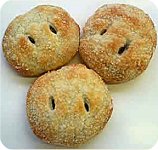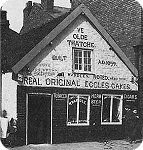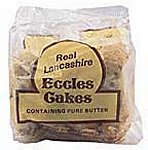 |
eccles
cake - a brief history & recipe |
 |
|
 |
|
|
This brief history of the Eccles Cake was first published on Waitrose.com
in June 2002. For the recipe click here.
Local-boy-made-good Kevin Gould retreads
the streets of his Lancashire hometown to tell the story of the
Eccles cake, a puff pastry parcel filled with succulent Greek currants.
|
It is Salford's sachertorte, Bury's
brioche, Bolton's baklava and Chorlton's croissant. It is the Eccles
cake, a deceptively simple Manchester-made confection that ranks
with the world's best baked goods. I'm proud to say I was born in
Eccles, a currant's throw from Bradburn's 'Only Old Original' Eccles
cake shop on Church Street. Bradburn's has now gone to that pastry
shop in the sky, and the inheritors of the mantle are the Edmonds,
who have devoted their working lives to the baking of proper local
patisserie. By 'proper', of course, I mean 'real'.
When I were a lad, 'real' meant 'very',
as in United are real good. Although Manchester is now a bustling
hub inhabited by loft-dwelling types, Ann and Ian Edmonds are still
keeping it real, the fourth generation to produce Edmonds' Real
Lancashire Eccles Cakes. Baked from puff pastry that envelops succulent
dried fruit, the Eccles cake is a heavenly handmade product, its
currants steeped in sugar, its origins steeped in history. |
| |
|
Eccles is now subsumed
into Greater Manchester, but it is a borough with a proud history.
It's name probably derives from the Greek ecclesia, meaning 'assembly'
and, indeed, it is famous for an annual assembly - the 'Wakes',
a fair characterised by licentious maypole dancing, copious ale
quaffing and conspicuous currant-cake consuming. Sadly, the urban
planning of the Sixties took much of the soul out of Eccles, and
by the late Seventies the Edmonds had relocated to Ardwick, in sight
of Belle Vue, in my youth the home of Saturday Night All-In Wrestling,
now an estate of executive homes. The boulevards of Ardwick itself
are now fringed by university buildings, Commonwealth Games sports
stadia, and the world's only purpose-built Eccles cake factory.
|
 |
| |
|
My father's concept was that the
product should be made just like it would at home, says managing
director, Ann. Only on a bigger scale. Bigger is right. Kenneth
started the factory with just eight staff; his daughter now employs
70 people who between them make a whopping 750,000 cakes a week.
Each cake, however, is still made by hand.
The factory door opens and the soothing
smell of warming pastry welcomes us. We use ten tonnes a week of
the best currants money can buy, says Ian. Known as 'Vostizza A',
these come from a Greek farmer's co-op in Aeghion, a town near Corinth,
from whose name we get the word 'currant'. It takes five tonnes
of grapes (dried by placing them alternately in the sun, then the
shade) to yield a tonne of currants. It's no surprise that the firm
is the co-op's largest client, and that its manager's office is
festooned in tribute with pictures of Old Trafford's finest.
Even though the currants arrive ready-washed,
workers carefully wash them again. This allows us to quality-control
the fruit, says Ian, and plumps it up a little, ready for baking.
The fruit emerges a glistening blue-black and is taken to the bake-room,
where it is mixed with sugar and butter.
|
| |
|
 |
We make the puff pastry as I would
at home, with untreated flour, butter and a pinch of salt, Ann
continues. The only difference is that here we use machines to
roll it out. The pastry is cut into strips and fed down a conveyor
belt, along which workers with quick, clever fingers place a handful
of the buttery, sugary mixture, before folding the pastry over
on itself. So skilled are they that the effect is mesmerising,
like watching origami on fast forward. Each cake is around 4cm
in diameter but, because of the hand-work, no two are the same.
At the end of the line, they are put on trays, washed with milk
and hand-pricked. Purpose-built ovens cook them on turntables
for an even bake before they are wheeled out, their pastry shells
a dappled gold.
|
| |
|
Ann and Ian agree that, while mechanisation
makes economic sense, it's worth retaining the handmade process.
It's the only way to make an individual product, says Ann. I remember
well the smell in my Mum's kitchen of Eccles cakes warming in the
oven for an after-school treat. Have they changed? Not one bit.
They're still densely flavoured, deliciously sweet local delicacies
- real Lancashire, real Eccles cakes, and real good, too.
|
|
| RECIPE |
Ingredients
500g flaky pastry
25g melted butter
Nutmeg
50g mixed peel
100g sugar
200g currants
|
Method
On a lightly floured surface, roll the pastry thinly and cut into
rounds of about half a centimetre thickness and 10cm diameter. Warm
the butter in a saucepan and mix into it the sugar, currants, nutmeg
and peel. Place a teaspoonful of this mixture into the centre of each
pastry round. Dampen the edges of the pastry. Press the edges together
sealing in the currants etc. Place upside down on a greased baking
tray and press them down a little. Make three small cuts across the
centre of each cake. Brush with water and sprinkle with a little sugar.
Bake at 425°f/220°c for 20 minutes. |
| |
|
|